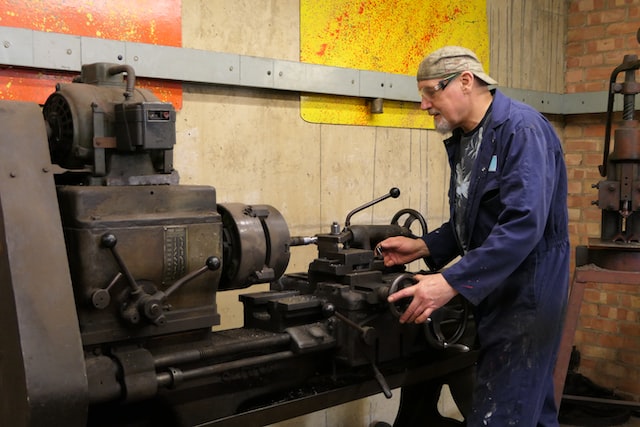
Machine shops utilize various types of equipment to perform their specific operations each day. However, heavy equipment is necessary for some applications as it provides the power, precision, and durability to handle large projects. This might include cutting through rigid materials, lifting heavy components, or delivering highly accurate results. This article will discuss the essential heavy equipment that every machine shop needs.
Heavy Machinery Needed in Every Machine Shop
Lathe Machine
One of the most important pieces of machinery in a machine shop is the lathe. This machine can quickly turn cylindrical workpieces, boreholes, and drill holes. A lathe machine can also perform threading, facing, and taper-turning operations. To meet different needs, a lathe machine comes in various sizes, including small benchtop models and large industrial models.
Milling Machine
A milling machine is another essential piece of heavy equipment for machine shops. This machine can shape metal and other solid materials using rotary cutters. A milling machine can perform various operations, including drilling, cutting, and slotting. Some advanced milling machines can also perform complex tasks such as threading, gear cutting, and routing.
Grinding Machine
A grinding machine is a heavy-duty tool that removes material from a workpiece by abrasion. Grinders have abrasive wheels that can make quick work of metals and ceramics. This machine can execute several operations, including surface, cylindrical, and internal grinding. A grinding machine is crucial for machine shops that deal with metalworking.
CNC Machine
A piece of heavy machinery that relies on computer code to direct its motions is called a Computer Numerical Control, or CNC, machine. A CNC machine can achieve various processes, including cutting, drilling, and shaping. This machine is ideal for machine shops that require high precision and accuracy in their operations. CNC machines come in various types, including CNC milling machines, CNC lathes, and CNC routers.
Plasma Cutter
A plasma cutter is heavy equipment that uses a high-velocity jet of ionized gas to cut through metal and other solid materials. This machine is ideal for machine shops that deal with metalworking, as it can cut through thick metals quickly and accurately. Plasma cutters are also helpful for creating intricate designs and shapes in metalwork.
Hydraulic Press
A hydraulic press is a heavy-duty machine that uses hydraulic pressure to shape and form materials. This machine is ideal for machine shops that deal with metalworking, as it can bend, form, and press metal sheets with high precision. Hydraulic presses, including small benchtops and large industrial models, come in various sizes to meet different needs.
Welding Machine
A welding machine is heavy equipment used to combine two pieces of metal or other solid materials. This machine uses heat to melt the materials and form a bond. Welding machines are crucial for machine shops that deal with metalworking and fabrication. Several types of welding machines are available, including TIG, MIG, and Stick welding machines.
Benefits of Heavy Equipment for Every Machine Shop
Increased Productivity
Heavy equipment can significantly increase the productivity of a machine shop. These machines can perform complex tasks quickly and accurately, allowing machine shops to take on larger projects and complete them faster. Heavy equipment such as CNC machines, milling machines, and lathes can perform multiple operations simultaneously, saving time and increasing efficiency.
Improved Precision
Precision is crucial in machine shops, and heavy equipment can provide the necessary accuracy for high-quality products. Heavy equipment such as grinding machines, CNC machines, and hydraulic presses can perform operations with micron-level accuracy, ensuring that the final product meets the required specifications.
Consistency
Consistent output is possible with the help of heavy machinery, guaranteeing that the end product will be up to code. For machine shops engaged in large production, consistency is of the utmost importance, as it serves to lessen the possibility of mistakes and flaws.
Drawbacks of Heavy Equipment
High Cost
Heavy equipment can be expensive, and the initial investment can be a significant financial burden for small machine shops. Additionally, heavy equipment such as overhead bridge cranes may require regular maintenance, which can also be costly. These costs must be taken into consideration, particularly during periods of economic downturn.
Large Space Requirements
Large, heavy machinery often occupies a significant amount of space and is cumbersome. It may be difficult for machine shops with little room to accept heavy equipment, and they may need to modify their workplace. These adjustments may be expensive and time-consuming, and they could also restrict the kinds of jobs that a machine shop can accept.
Specialized Training Requirements
Heavy equipment is complex and requires specialized training to operate. Machine shops must invest in training their employees to use heavy equipment safely and efficiently. This training can be time-consuming and expensive, particularly for new employees unfamiliar with the equipment.
Conclusion
Heavy equipment is necessary for machine shops that deal with metalworking and fabrication. The above-cited machines are some of the essential heavy equipment that every machine shop needs. These machines provide the necessary power, precision, and durability to handle large projects, cut through rigid materials, and deliver accurate results. Machine shops should invest in high-quality heavy equipment to ensure that no project is too big.


